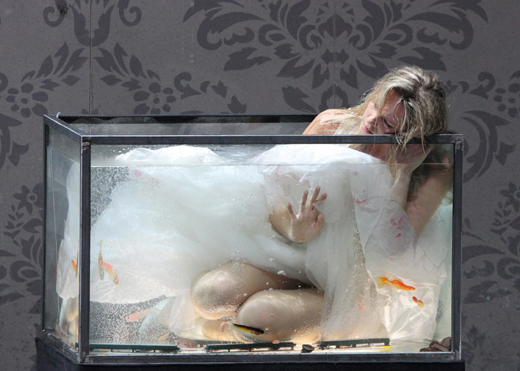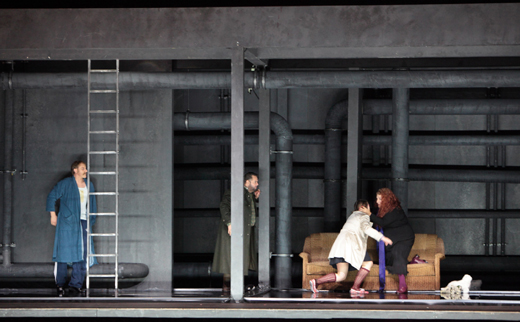A. Dvořák, Rusalka: Soloists, Bavarian State Orchestra, Chorus of the Bavarian State Opera, Tomáš Hanus (conductor), Munich National Theater. 18.07.2011 (JMI)
Production Bavarian State Opera
Direction: Martin Kusej
Sets: Martin Zehetgruber
Costumes: Heidi Hackl
Lighting: Reinhard Traub
Cast:
Rusalka: Kristina Opolais
Prince: Piotr Beczala
Water Spirit (Vodnik): Alan Held
Ježibaba: Janina Baechle
Foreign Princess: Nadia Krasteva
Gamekeeper: Ulrich Ress
Kitchen Boy: Tara Erraught
Wood Nymphs: Evgeniya Sotnikova, Angela Brower, Okka Von der Damerau

The first opera of my annual trip to Munich has been Rusalka in Martin Kusej’s production. It premiered last November when it was reviewed Bettina Mara. (Read the review here). If one accepts his idea—Water Spirit and Ježibaba as the dysfunctional parents, with overtones of abuse, rape, and the Josef Fritzl case—Martin Kusej’s work is consistent and well done. Personally, I prefer the original story, as we lose much with the great nobility of Vodnik reduced here to a lecherous, depraved father. The stage direction by Martin Kušej is excellent, particularly his work with Latvian soprano Kristina Opolais as the protagonist, whose stage performance is most demanding.
The musical direction was entrusted, as at the premiere, to Czech Tomáš Hanus, whose reading was full of rapture and passion from start to finish. He didn’t seem to take much care of the singers on stage, though, whose voices were covered on more than one occasion by the volume of sound coming out of the pit. As usual, the orchestra performed splendidly, as did the Choir.
 A.Dvořák, Rusalka, Mackerras / Czech PO / R.Fleming, B.Heppner et al. Decca  A.Dvorak, Rusalka, T.Hanus / Bavarian State Opera / K.Opolais, K.F.Vogt et al. Martin Kusej C Major DVD |
Swedish soprano Nina Stemme had originally been cast as Rusalka in this production, but she cancelled some time before the premiere, considering that her voice was not anymore the most appropriate for the character. She was replaced by the young (31) Kristina Opolais, who created a—pun intended—considerable splash with it. This attractive young soprano, the wife of conductor Andris Nelsons, is a real stage animal and Martin Kušej couldn’t be more fortunate to have her perform his Rusalka. Her stage performance was a dream from start to finish and it will be very difficult to see this production in the future without her. In vocal terms she is a lyric soprano of attractive and homogeneous timbre who knows how to use her instrument to express emotions. The best part of her voice is at the top of the range, while the middle range is half a size too small and the lower range is weak. Still, she is the perfect answer to today’s fashion in the world of opera, with demands on acting and believability rightly higher. She is a young and very attractive singer with an interesting voice and superb performing skills. One will have to see what happens with her in the future.
Piotr Beczala was the Prince and he offered his beautiful voice to a character that stretches it to its limits. He sang with much taste and elegance throughout, without forcing his instrument at any time, even when his voice could not be heard by the audience. He shone particularly in the final scene.
American baritone Alan Held was Vodnik, the Spirit of the Waters, whose performance was good within the parameters of violence and lack of nobility that the production requires. I confess that I prefer a true bass in this character and in a different production also someone more noble sounding.
Janina Baechle was good as Ježibaba but far from what I have heard from others in that role. Bulgarian mezzo soprano Nadia Krasteva was the Foreign Princess—a character I find requires a soprano. Not surprisingly her top notes were very tight, unpleasant at times, even as they sat on an excellent middle register. All the secondary roles were very well cast.
José MªIrurzun
